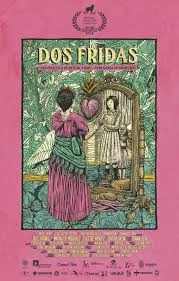Sundance 2019: "Dos Fridas" Review
Dos Fridas is a dualistic film that reflects upon life and death while toying with reality and imagination. The history behind Frida Kahlo’s life is not well known and Dos Fridas is inspired by traumatic events that happened to her towards the end of her life (she passed away at age 47). The film beautifully portrays how Kahlo dealt with those events mentally and physically.
The film follows the relationship between Kahlo and her newly hired nurse Judith (played by Maria de Medeiros) who also suffers similar experiences as Frida. Writer/director Ishtar Yasin Gutierrez also acts as Frida Kahlo in the film with a commanding presence that demands attention. The film mixes reality with imagination and the past with the present, which is developed through Mexican folklore, surrealism and existentialism. It is not a “feel good movie” in the least bit and the film even forces the audience to contemplate the meaning of life. It is important to note that the name Dos Fridas is a nod towards one of Frida Kahlo’s oil paintings called The Two Fridas, this painting is a double self portrait. The film cleverly reflects opposing things, which is also portrayed in The Two Fridas.
An important part of Dos Fridas is the almost all female cast. The lead actors are female, the supporting actors are female and there aren’t that many speaking roles that are men. With that being said, most of this film passes the test for feminist film theory, women are in powerful roles, the focus of their conversations is not about men, and they are fully clothed. These minor details may not seem too important to an average viewer but this is a big change from the norm in traditional Hollywood films. Deliberate actions to uphold women positively in cinematic art is poetic in itself and Dos Fridas exposes a new realm of beauty.
Alongside the strong casting decisions and feminist approach, the film is filled with Mexican Folklore, from Mexican sugar skulls, to the mariachi performing in Frida’s backyard; the film interprets the Mexican culture in a beautiful way that depicts the truth of Frida’s heritage. Through surrealism and expressionist techniques, Ishtar Yasin Gutierrez creates a narrative that is reflective of Luis Buñuel (the iconic Latino filmmaker) who created the 1952 film Mexican Bus Ride. Both of these films don’t follow a sequential timeline in regards to the narrative, which is common practice of Luis Buñuel; both films also create uncomfortable scenes through intense drama. Even though the stories within these films are both somewhat sad, they are told with such content of the Mexican culture that the beauty of it shines through regardless.
One relative piece of Mexican culture that stands out in the film is the traditions in embracing life as well as death, while not being afraid of the afterlife. Frida Kahlo oftentimes painted very violent pieces of work because it was her way of escaping the pain in her life; this film portrayed that sorrow in a realistic yet artistic way. This approach to portraying Frida Kahlo in her raw emotions makes this film incredibly expressionistic in a way that is unsettling but it also makes the viewer ponder the meaning of life. This is also portrayed through what is fake vs reality in the film; things dramatically change without any preemptive warnings- very much like Luis Buñuel films. If you are a fan of films that follow a strict narrative, this is not the film for you; however if you do enjoy that type of cinematic approach, you’re in for a ride.
Ultimately, this film is a love poem to Frida Kahlo and the Mexican culture. It reflects upon resilience through pain, freedom of artistic expression, as well as freedom of sexuality. The actors in the film create a wonderfully surreal story that exposes a new light into Frida Kahlo’s tough life. This film is truly a gift to the Mexican art community, and the Latino art community as a whole. It unapologetically speaks truth of things that are oftentimes overlooked within Frida’s life, and creates a reflective story through her trauma. I truly enjoyed Dos Fridas as a Latina filmmaker myself, and I would highly recommend viewing this film when you’re in an existential mood.
Rating: A



